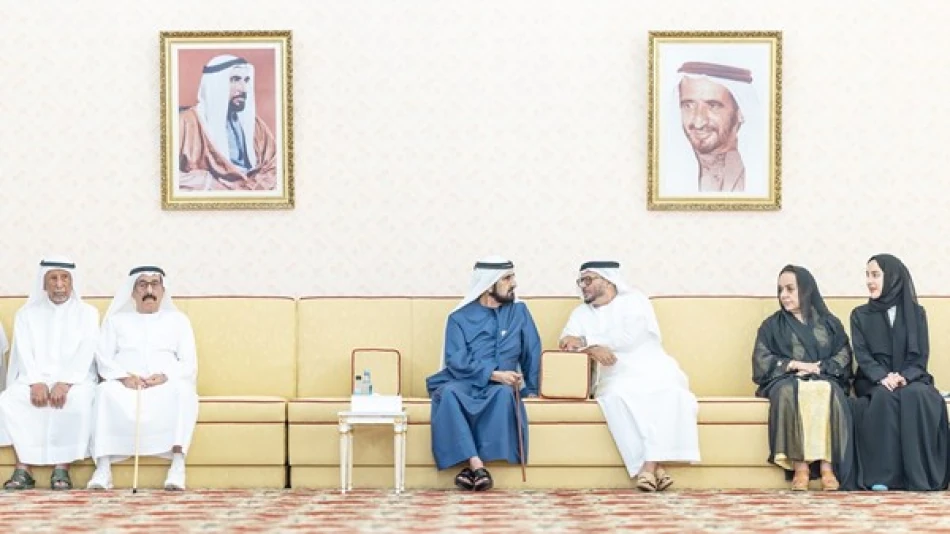
Dubai's Visionary Leader Connects with Emirati Elites, Businesses, and Government Officials
Dubai's Wealth Magnet Strategy: How the Emirates Became the World's Top Destination for High-Net-Worth Individuals
The UAE has quietly transformed into the world's premier destination for wealthy individuals, with over 131,000 high-net-worth people now calling the country home as of 2024 — a dramatic increase from 116,000 just one year earlier. This surge reflects Dubai's calculated strategy to position itself as the ultimate safe haven for global capital and talent, leveraging political stability, tax advantages, and world-class infrastructure to capture an increasingly mobile wealthy elite.
The Numbers Tell a Compelling Story
The UAE's appeal to the world's wealthy isn't accidental — it's the result of deliberate policy choices that have created an irresistible value proposition. Sheikh Mohammed bin Rashid Al Maktoum, UAE Vice President and Prime Minister, recently highlighted this success during a high-level gathering with business leaders, government officials, and investors at the Union House in Dubai.
The statistics are striking: Dubai welcomed 9.88 million visitors in just the first half of 2024, while the country expects to add another 10,000 wealthy residents this year alone. This represents a growth rate that outpaces traditional wealth hubs like Switzerland, Singapore, and even parts of the United States.
Why Dubai Wins the Global Talent War
Strategic Geographic Advantage
Dubai's success mirrors Singapore's rise as an Asian financial hub, but with key advantages. Located at the crossroads of Europe, Asia, and Africa, the emirate offers unparalleled access to emerging markets while maintaining Western business standards. This positioning has proven especially valuable as geopolitical tensions reshape global trade routes.
Tax Policy as Competitive Weapon
Unlike traditional financial centers grappling with increasing tax burdens, the UAE maintains its zero personal income tax policy — a crucial differentiator when wealthy individuals from high-tax jurisdictions like the UK, France, and California seek new homes. This advantage has become more pronounced as Western governments pursue wealth taxes and higher capital gains rates.
The D33 Economic Agenda: Ambitious Goals with Measurable Results
Dubai's Economic Agenda D33 represents more than typical government planning — it's a comprehensive blueprint to double the emirate's economy and cement its position among the world's top three economic centers. According to Sheikh Mohammed, the agenda is progressing faster than originally projected, driven by investor confidence and market maturity.
This acceleration reflects a broader trend where nimble, business-friendly jurisdictions outpace traditional economic powers hampered by bureaucracy and political gridlock. Dubai's ability to implement policy quickly — from visa reforms to new business regulations — gives it a decisive edge over slower-moving competitors.
Technology Integration: Beyond Traditional Wealth Management
The recent demonstration of the Unitree G1 robot at the Future Museum illustrates Dubai's commitment to technological leadership. While seemingly ceremonial, such investments signal to potential residents that Dubai isn't just a tax haven — it's a forward-looking hub for innovation and technological advancement.
This strategy differentiates Dubai from purely tax-driven destinations. By positioning itself at the forefront of artificial intelligence, robotics, and digital innovation, the emirate attracts not just passive wealth but active entrepreneurs and tech leaders who drive economic growth.
Market Implications for Global Wealth Flows
Dubai's success has profound implications for traditional wealth management centers. Swiss banks, London financial districts, and New York investment firms must now compete not just on services but on the entire lifestyle package their jurisdictions offer.
For investors, this trend suggests continued capital flows toward jurisdictions offering political stability, tax efficiency, and high-quality infrastructure. Real estate markets, luxury goods sectors, and financial services in Dubai stand to benefit disproportionately from this wealth concentration.
Challenges and Sustainability Questions
While Dubai's current trajectory appears unstoppable, several factors could impact its long-term success. Regional geopolitical tensions, global tax coordination efforts by organizations like the OECD, and potential economic diversification challenges all represent risks to the current model.
However, Dubai's track record of adapting to changing circumstances — from oil dependency to service economy transformation — suggests the emirate will continue evolving its value proposition to maintain its competitive edge in the global competition for wealth and talent.
Most Viewed News

 Layla Al Mansoori
Layla Al Mansoori






